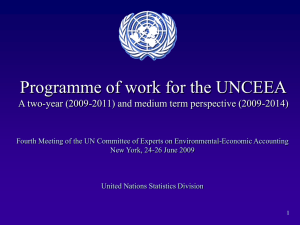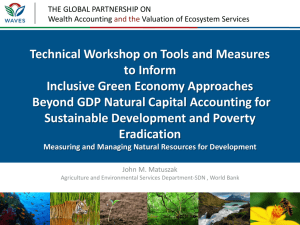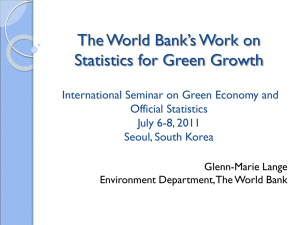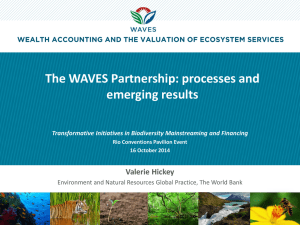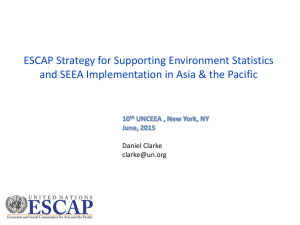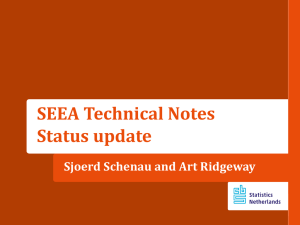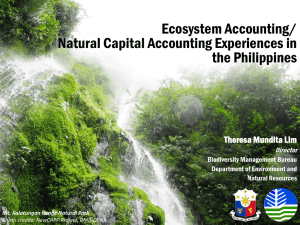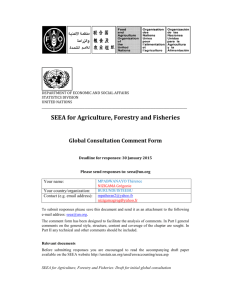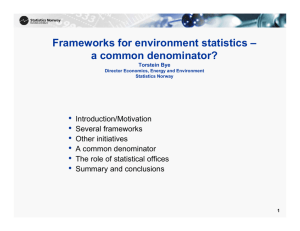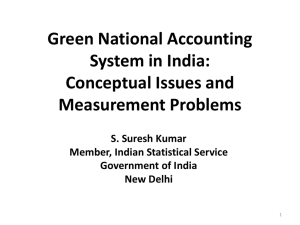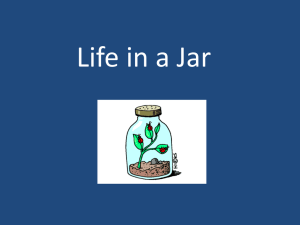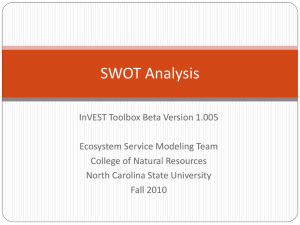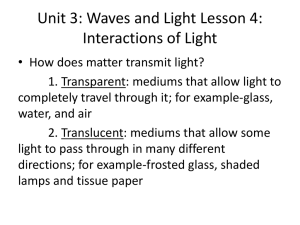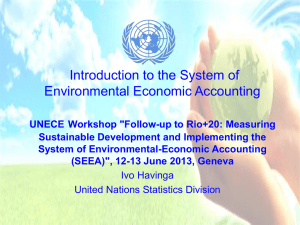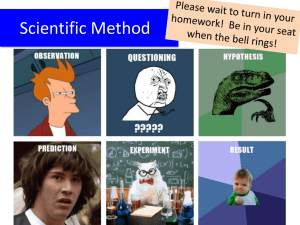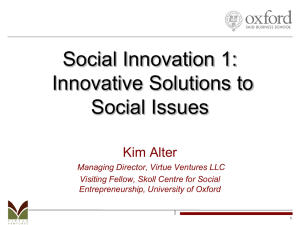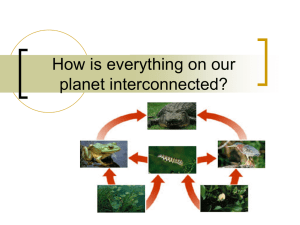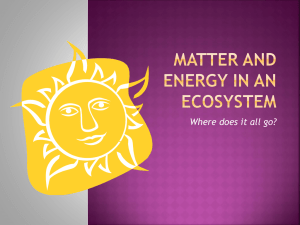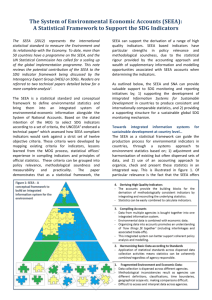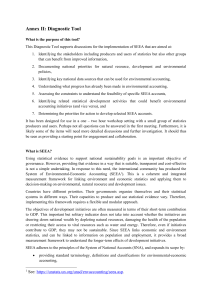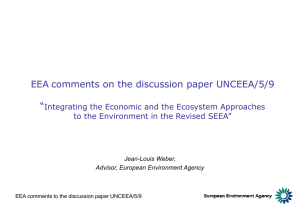Natural Capital Accounting 8th meeting of Botswana
advertisement
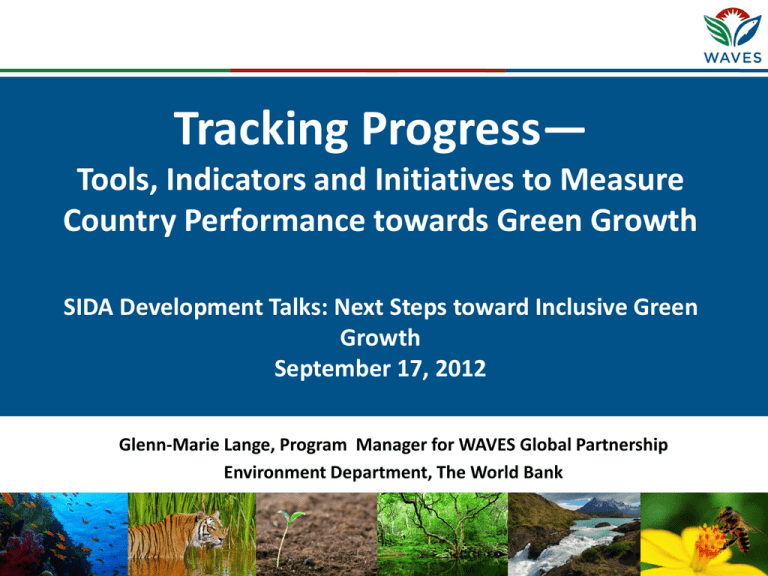
Tracking Progress— Tools, Indicators and Initiatives to Measure Country Performance towards Green Growth SIDA Development Talks: Next Steps toward Inclusive Green Growth September 17, 2012 Glenn-Marie Lange, Program Manager for WAVES Global Partnership Environment Department, The World Bank Inclusive Green Growth relies on: Better incentive schemes (fiscal policy, etc) Better measurement—Natural Capital Accounting – Better indicators to monitoring green growth (Beyond GDP) – Detailed statistics as a management tool • design incentive schemes, optimize use of natural capital • Builds this information as satellite accounts to the System of National Accounts Indicators for Green Growth 1. Macroeconomic Indicators—Is GDP growth sustainable or are we just “living off our natural capital?” Development as a process of building and managing a portfolio of assets Comprehensive Wealth & Adjusted Net Savings 2. Specific natural capital indicators to monitor: – Resource intensity or productivity trends (energy, water, pollution) – Stocks, land & forests – Environmental expenditures, taxes & subsidies, costs of degradation World Bank & Statistics for Green Growth Genuine Saving Rates in EAP, ECA and SAR 35 30 percent of GNI Adjusted Net Savings (ANS) is calculated annually, available online and in annual publications 25 20 East Asia & Pacific 15 Europe & Central Asia 10 South Asia 5 2008 2005 2002 1999 1996 1993 1990 1987 1984 1981 1978 1975 0 ◦ Little Green Data Book (started in 2000) Adjusted Net Savings, Adjusted Net National Income ◦ World Development Indicators Resource Rents, Adjusted Net Savings, and Adjusted Net National Income World Bank & Statistics for Green Growth Comprehensive Wealth Accounts updated less frequently, data available for years: 1995, 2000, 2005 Flagship Reports: ◦ Where is the Wealth of Nations? Measuring Capital for the 21st Century (2006) ◦ The Changing Wealth of Nations Measuring Sustainable Development in the New Millennium (2011) Managing Green Growth: Natural Capital Accounts Statistics for better management of natural capital to support growth & poverty reduction • What is the real contribution of Natural Capital to GDP and household livelihoods; • How do we weigh tradeoffs among competing users - • How do we balance land use for tourism, agriculture and other ecosystem services like carbon storage or water quality? How can we make ecotourism work for the local communities, to ensure social and economic inclusion? How do we model the impacts of changes in resource pricing, removal of subsidies on economic activities, on the poor How much should be invested in natural capital, like protected areas? In WAVES countries, statistics for management are more important than macroeconomic indicators Initiatives for GG Measurement Global Partnership for Wealth Accounting and Valuation of Ecosystem Services (WAVES) WAVES is working closely with World Bank’s Green Growth Program on country GG studies Natural Capital Accounting Initiative—Rio+20 Expanded ‘WAVES’ initiative for widespread, rapid rollout Major Partners on NCA WAVES is looking to work closely with specific partners WAVES Global Partnership for Natural Capital Accounting 5-year, $15 million Global Partnership—UNDP, UNEP, UNCEEA, partner countries, NGOs, academics, private sector, others to 1. Implement natural capital accounting in 6-10 countries: • Colombia, Costa Rica, Botswana, Madagascar, Philippines (India, Vietnam, Mexico, others..) • Australia, Norway, UK, Canada, France, Spain, Netherlands 2. Incorporate natural capital accounts in policy analysis and development planning 3. Scientific credibility —Policy & Technical Experts Committee to develop methodology for ecosystem accounting for the SEEA 4. Promote global adoption of natural capital accounting beyond the pilot countries Natural Capital Accounting under WAVES Implement SEEA standards & pilot SEEA ecosystem accounts: • Physical measures & monetary value of ecosystem services produced annually and cost of degradation • Distribution of benefits from ecosystem services, and burden of degradation among different stakeholders • Value of assets —developed for alternative scenarios Issues: • • • • Prioritizing ecosystem services: where can we make credible progress quickly Scaling up from specific ecosystems to national level Valuing public lands, global commons Handling thresholds, irreversibilities, low probability-high impact events Valuation techniques: • Market prices for provisioning & recreational services • Ecological production functions for regulating services, drawing on local and international models such as InVest, ARIES and others Where are we now with WAVES? Preparation phase concluded, 2011-June 2012: • Global partnership established – • Policy and Technical Experts Committee established to develop methodology for ecosystem accounting and organize training • Scoping out studies for natural capital accounting in 5 developing countries: Botswana, Costa Rica, Colombia, Madagascar, Philippines Implementation Phase: 2012-2016 Work plans approved and implementation beginning in Botswana and Madagascar, with other countries beginning shortly Policy and Technical Experts Committee first meeting Nov 7-9 WAVES at Rio+20: the ’50/50’ Campaign for Natural Capital Accounting Building on the Gaborone Communique on NCA from the African Sustainability Summit, hosted by Botswana May 24-25, signed by 10 African countries 62 (32 developing) countries signed the NCA Communique, endorsing • Implement natural capital accounting where there are internationally agreed statistical standards –the SEEA • Develop methodology for the more difficult to measure natural capital – ecosystem services • Demonstrate how NCA can support decision-making for sustainable development Concept Note for follow-up drafted for NCA Initiative widespread, rapid rollout of SEEA Major Partners and Related Initiatives SEEA: – UNCEEA, Task force on Implementation of the SEEA Ecosystem valuation and accounting – UK’s Natural Capital Committee, ESPA – UNEP: ProEcoServ, UNDP-UNEP Poverty Environment Initiative – The Natural Capital Project – Resources for the Future – Center for the Mgmt of Ecological Wealth – Beijer Institute-Duke University – UNCEEA Vol 2 of SEEA Experimental Accounts for Ecosystems Link with private sector initiatives – TEEB Business Coalition, TEEB Oceans and Coasts, etc.
